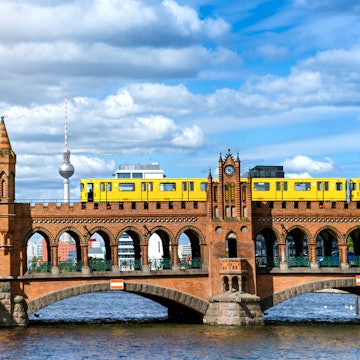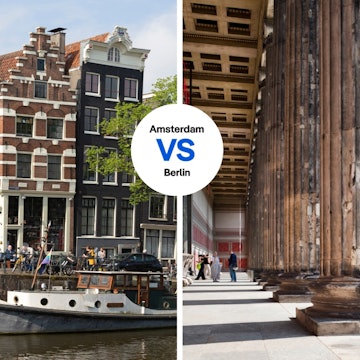

Learn all about Späti culture in Berlin and how you can get involved © Hinterhaus Productions / Getty Images
In some cities, they’re called convenience stores, in others, bodegas, but in Berlin, those pint-sized late-night shops you see everywhere are Späti, and they’re integral to the city’s everyday life.
Spätis, short for Spätkauf (in German, “late-night purchase”), are tiny, independently owned retailers selling snacks, alcohol and beverages, tobacco, and so on. As the name suggests, they are open ‘til the wee hours (sometimes 24/7), long after supermarkets shut. This makes Spätis a centerpiece of big nights out in Berlin: a place for pre-drinking before clubs and bars, late-night snacks, and picking up beers en route to the afterparty.
Some of my fondest memories as a decade-long Berliner are on Späti stoops, whether swigging cheap wine outside during the pandemic or the more recent unforgettable experience of DJing at a Späti rave (before the police came, of course).
Here is everything you need to know about Berlin Späti culture.
History
Spätis are not just for the party crowd – these neighborhood spots are integral to Berliners’ everyday lives. It’s where us locals pick up parcels, pack picnics, and meet friends. The key to understanding their importance lies in the city’s past.
The emergence of Spätis can be traced back to the Cold War and Spätverkaufsstellen (“late shopping outlets”) in East German cities like East Berlin, Leipzig and Dresden. These privately-owned shops catered to shift workers outside the standard hours of state-owned retailers. Later, the term became synonymous with Berlin’s fast-paced, all-hours nightlife and anti-capitalist subculture. In a city so creative and culturally rich but economically poor, Spätis have long been energetic hotspots, and entertaining places for students, musicians, and artists to mingle with ease.
Today, Späti is a term that is culturally unique and Berlin-specific. Nowhere is the term quite so colloquial and important to the vernacular. In fact, elsewhere in Germany, convenience stores go by other names, such as Trinkhalle or kiosk.

Spätis represent the city’s free-spirit
Spätis are the essence of Berlin’s urban culture. They exemplify the city’s spontaneous, spunky and, often, hedonistic, nature, tempting passersby with a cold Wegbier (a beer to drink on the way somewhere) on every corner.
Once a symbol of old-school Berlin, Spätis are deftly modernizing. Gone are the days of Späti internet cafés (an unbelievable anecdote – in 2012, serial killer Luka Magnotta was caught in a one when its owner recognized him Googling himself). And while a recent law dictated that Spätis must stay closed on Sundays and public holidays, some live on the wild side, such as my former corner store, which had a Sunday street lookout watching for authorities.
Typically teeny, double-aisle shops are becoming bigger and flashier. New so-called “super-Spätis”, stocking pricey imported snacks and CBD-infused everything, are a byproduct of the city’s increasing gentrification and hipsterism, as are pop-ups, like Germany’s first sober Späti selling alcohol-free wine and gin.
Overall, Spätis exemplify the city’s everlasting drive to create vibrant communities against a strong foundation of individualism. Locals happily support these small businesses run by owners and their families. And in multicultural neighborhoods like Neukölln and Kreuzberg, they are meeting points for Turkish and Arab communities, promoting visibility through food and cultural wares.
Exactly here is where Späti culture adds charm to Berlin. This is no Kwik-E-Mart chain – each shop is unique. Aesthetics and state of upkeep vary wildly, and phone numbers and opening hours on Google are rarely correct. And in Germany’s capital, where the local culture is defined by gruff formality and small talk overrated, it’s neighborhood haunts like these which supply at least a little community togetherness.
Now you try
The most talked-about Spätis here are usually fighting gentrification, possess memorable décor or kooky products, and in typical Berlin fashion, throw the best parties. But, if you ask me, the best Späti experience isn’t one you look for, it’s the random hole-in-the-wall you stumble upon.
The markers of a good Späti are a street-facing bench for people-watching and more people hanging out. It’s a cooler that works, and a bottle-opener that hasn’t been stolen from the cash register. It’s about the joy of simplicity, cheap fun, and low expectations. And in its best, most purest form, it’s a heavenly place, not too far off in the distance, where thirst can be quenched – even at an ungodly hour.
And for a next-level adventure, go to a Späti rave. A party where DJs, speakers, and sweaty bodies do their best not to knock over gum racks is, quite simply, good times. They’re last-minute, rarely promoted, and well, illegal (thank you, German bureaucracy), adding to the allure.
The best time to see Späti raves in full-swing is on the May Day public holiday, when Kreuzberg’s streets are chock-full of them. From October to April, the collective ear-sight hosts parties at a changing lineup of Spätis, and neighborhood haunts like Volkan’s Party Späti and Spätkauf 178 also double their sales floors for dancing.

Take it with you
Keep that Späti feeling going strong by taking a selection of late-night, bad decision, weird German snacks home with you: chips flavored like peanuts, paprika and bacon are hot contenders, as well as Haribo gummies of infinite colors and shapes (and salty licorice if you’re nasty). My favorite Späti impulse, bottles of Berliner Luft (in German, “Berlin Air”), are always popular with out-of-towners – it’s a tasty peppermint schnapps, akin to mouthwash, but much better.
Take your Germany trip with Lonely Planet Journeys
Time to book that trip to Germany
Lonely Planet Journeys takes you there with fully customizable trips to top destinations–all crafted by our local experts.
























